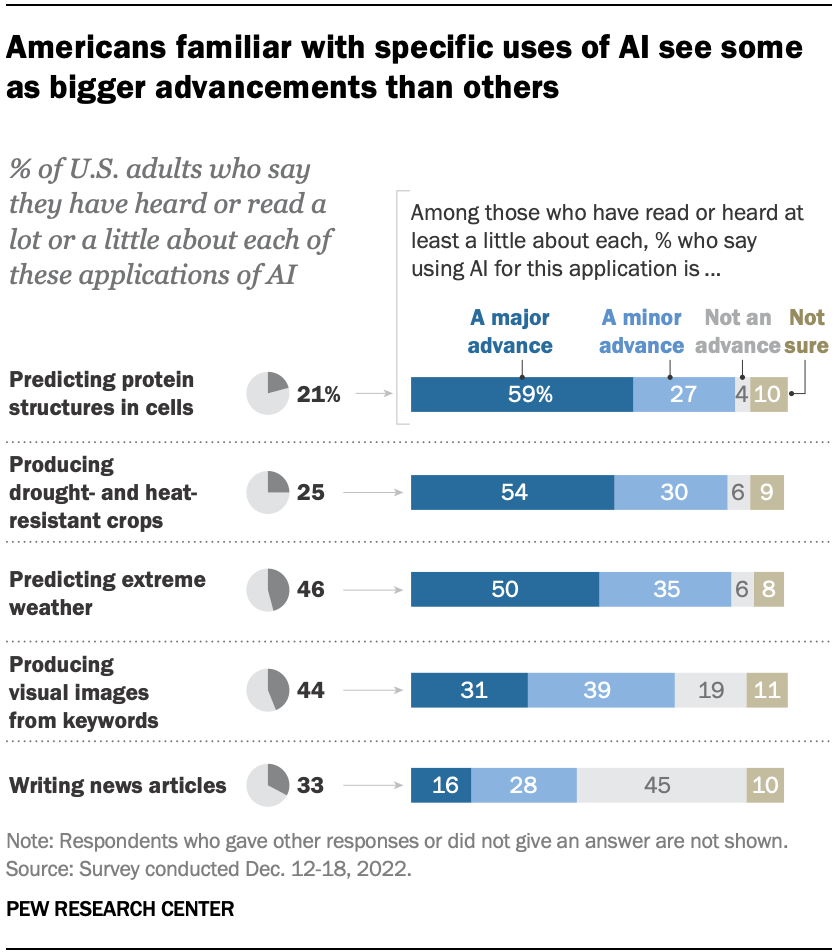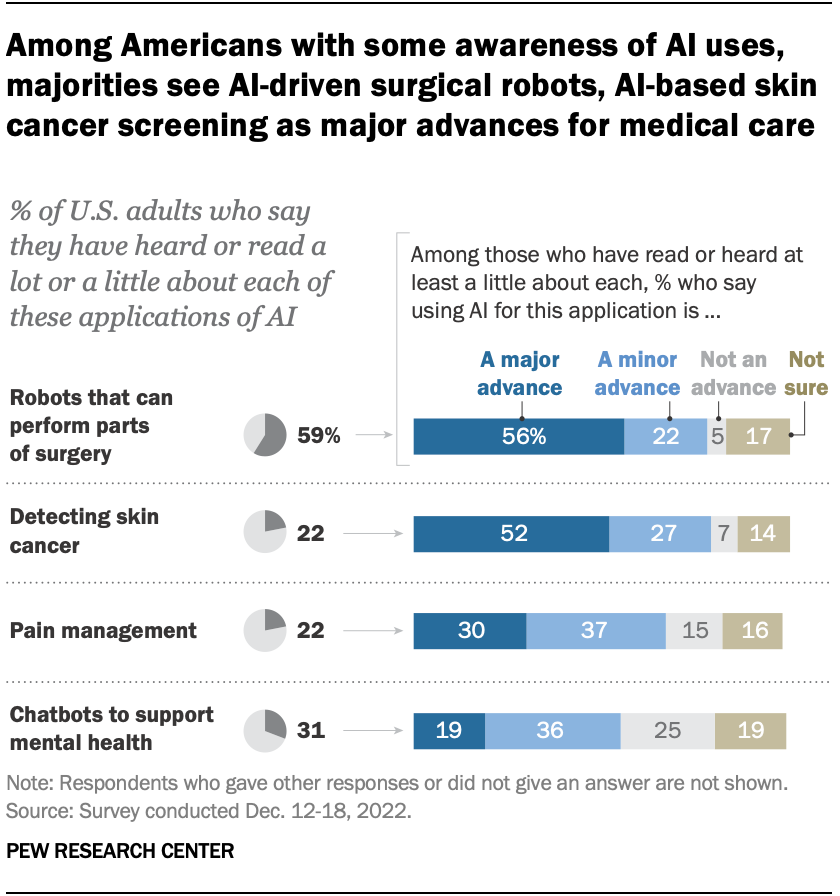Artificial intelligence has burst onto the scene recently with programs like ChatGPT, which can generate text responses to human inquiries, and DALL-E 2, which can create sophisticated images from a handful of keywords. The emergence of these and other technologies has intensified debate about what role AI should play in American life and who stands to benefit – or lose – as these advances increasingly shape the way people live.
A new Pew Research Center survey explores public views on nine specific AI applications that are currently in use or in the advanced stages of development, with implications for fields ranging from agriculture and medicine to news reporting and the visual arts. While public awareness of these AI applications is limited, the survey finds that Americans make clear distinctions about the value they see from these developments.
Pew Research Center conducted this study to understand Americans’ views of artificial intelligence and its uses. For this analysis, we surveyed 11,004 U.S. adults from Dec. 12-18, 2022.
Everyone who took part in the survey is a member of the Center’s American Trends Panel (ATP), an online survey panel that is recruited through national, random sampling of residential addresses. This way, nearly all U.S. adults have a chance of selection. The survey is weighted to be representative of the U.S. adult population by gender, race, ethnicity, partisan affiliation, education and other categories. Read more about the ATP’s methodology.
Here are the questions used for this analysis, along with responses, and its methodology.
This is part of a series of surveys and reports that look at the increasing role AI is playing in shaping American life. Read more about public awareness of AI’s uses in everyday life and Americans’ views on its applications in health care.

Among Americans who have heard about AI programs that can write news articles – a use closely connected with platforms such as ChatGPT – a relatively small share (16%) describe this as a major advance for the news media, while 28% call it a minor advance. The largest share (45%) say it is not an advance at all. (Survey respondents were asked about the use of these conversational AI tools to change the way news information is developed and shared. In the two months since the survey was conducted, there has been a flurry of articles about ChatGPT and similar AI programs, discussing their implications for a wide range of fields and professions.)
Similarly, among those who have heard of AI being used to produce visual images from typed keywords – as is the case with programs such as DALL-E 2 or Midjourney – only around three-in-ten (31%) describe this as a major advance for the visual arts, while another 39% call it a minor advance.
By comparison, Americans are more likely to view some AI developments in medicine, biology, agriculture and weather forecasting as important developments for their respective fields.
Among those who have heard about using AI to predict the protein structures in cells, a large share of Americans view this either as a major (59%) or minor (27%) advance for medical research. One example of this technology is DeepMind’s AlphaFold application, which has the potential to speed up the development of medical treatments.
Applications of AI in agriculture and weather prediction are also met with robust enthusiasm among those with some awareness of these developments. Slightly more than half (54%) of those familiar with using AI for guidance to produce drought- and heat-resistant crops say this is a major advance for agriculture, while another 30% call this a minor advance.
Similarly, among those with at least some familiarity with the use of AI to predict extreme weather conditions such as heavy rainfall or storms, half say this is a major advance for weather forecasting and 35% describe it as a minor advance.
The distinctions that Americans make about advances in AI are also evident on four other applications that the Center asked about – all of them related to health or medicine.

When asked about AI-driven robots that can perform parts of surgery, a 56% majority of those familiar with this say it is a major advance for medical care, while 22% call it a minor advance. Just 5% of this group says it is not an advance. (Read this recent Center report for more on how Americans feel about artificial intelligence in health and medicine.)
Public reactions to AI-based skin cancer detection are also positive. Among those who have heard at least a little about using AI to review images of people’s skin and look for evidence of cancer, 52% call this a major advance for medical care and another 27% say it is a minor advance.
By comparison, Americans are less likely to say using AI to help decide the amount of pain medication that a patient receives is a major advance. Among those aware of this AI application, three-in-ten consider it to be a major advance for medical care; another 37% call it a minor advance.
The public is less enthusiastic about the idea of using chatbots to provide virtual mental health support, as is possible on platforms including Woebot and Wysa. Among U.S. adults with some awareness of these chatbots, 19% say this is a major advance and 36% say this is a minor advance for mental health support. Another quarter of this group says this is not an advance.
For many of the AI applications asked about in the Center’s survey, some Americans say they are not sure whether the development represents an advance or not. For example, 19% of those who have heard about chatbots being used to provide mental health support say they are not sure whether this represents an advance or not – a reminder that public attitudes about these technologies are still forming.
Note: Here are the questions used for this analysis, along with responses, and its methodology.







